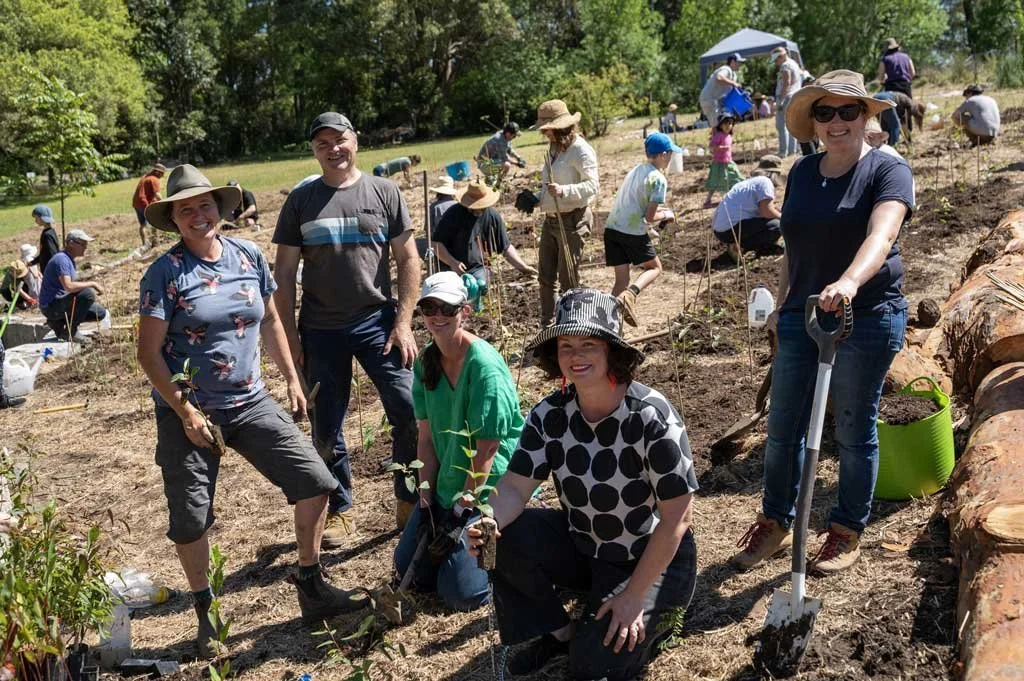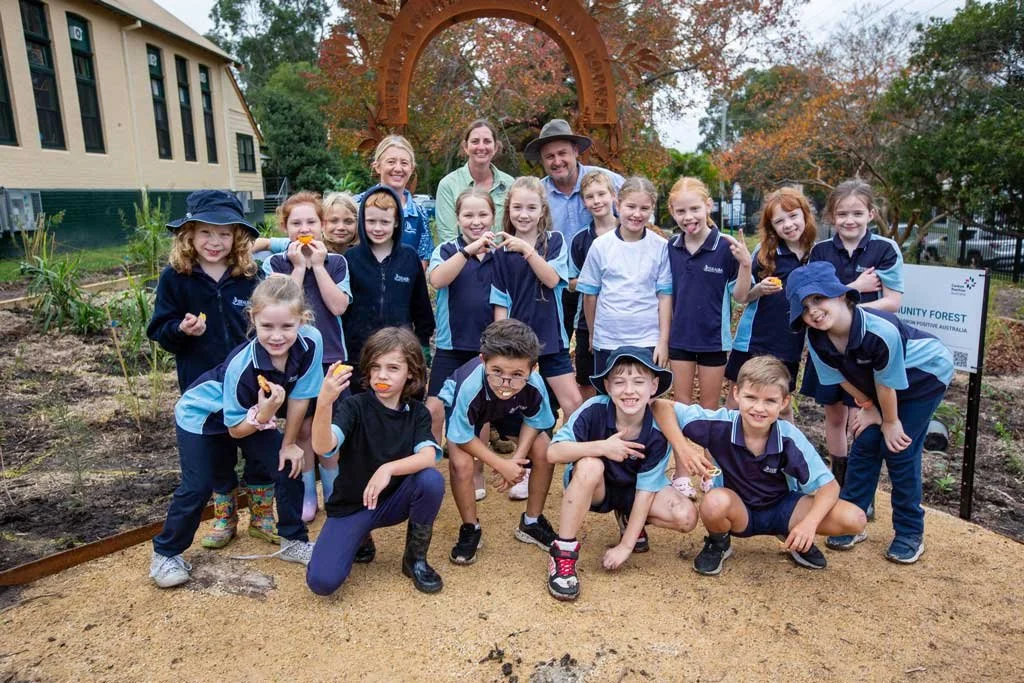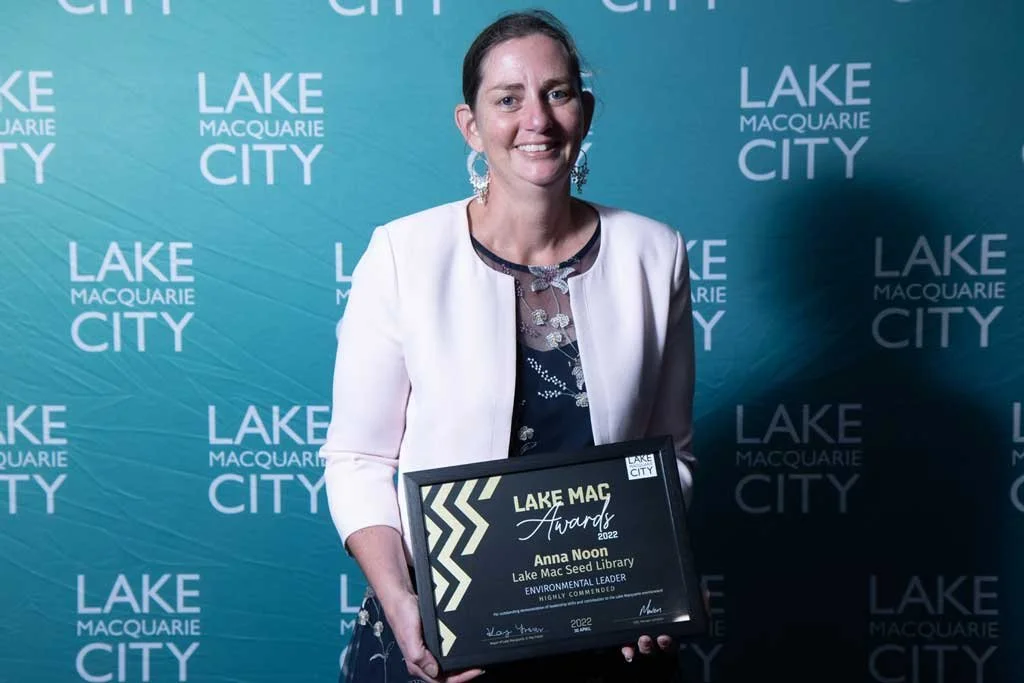Anna Noon On The Value Of Regenerating Native Habitats And Building Tiny Forests
A passionate advocate for social, environmental, and climate justice with over two decades of experience in the field of social work, Anna Noon has previously supported some of the most vulnerable members of our community, including children who have experienced abuse and neglect and young people with high and complex needs.
Her wealth of experience also encompasses government contract management, procurement, and strategic partnership development, all aimed at driving systemic change for those in need.
More recently, Anna has redirected her focus on championing sustainability. Working in and with local and state governments, to help achieve their net-zero goals and implement circular economy practices. But, driven by a deep concern about the lack of pace by governments on climate action and a strong desire to drive change in partnership with community, Anna co-founded The Groundswell Collective—a not-for-profit organisation based in Lake Macquarie, NSW, who’s purpose is to bring people together to create a better planet.
It’s here Anna leads inspiring, hands-on grassroots initiatives focused on nature-based solutions to climate change, such as building tiny forests.
Her tireless efforts have earned her numerous accolades, including the 2024 Lake Mac Volunteer of the Year award, a finalist spot for the 2024 NSW Women of the Year – Community Hero, and the 2024 Taronga Hatch Accelerator Program winner.
Anna’s commitment to community and sustainability extends beyond her professional work. A firm believer in leading by example, she spends her free time volunteering, growing her own food, composting, creating native habitat gardens, upcycling, and electrifying everything!
Anna discusses how environmental habitat regeneration projects can impact the wellbeing of communities, and inspiring broader systems change through pulling the levers of government and social procurement.
Highlights from the interview (listen to the podcast for full details)
[Tom Allen] - To start off, can you please share a bit about your background and what led to your passion for social enterprises and regenerative projects?
[Anna Noon] - I'm going to skip straight to 2019; I'll save you from listening to all the early years of my career! At that time, I was living with my husband and two kids in this beautiful house near Lake Macquarie. We have been here for around 10 years, but I was becoming increasingly restless and wanting more space, particularly some land.
I'd grew up on four and a half thousand-acre sheep and cattle farm up in the New England area of New South Wales, and I was keen for my kids to have a bit more space and a country upbringing. We went and inspected this one-and-a-half-acre green oasis property, it had over 40 established fruit and nut trees, a chicken pen, and an established vegetable patch.
We all just fell in love with this property, and we bought it a couple of days later at an auction. But by the time the property settled, and it was time to move in, it was two weeks before Christmas in 2019. A lot of your audience will vividly recall the Black Summer bushfires that raged around the country in 2019.
Our little lush green part of the world had been turned into this charred piece of land, where the grass audibly crunched under your feet as you walked. My kids got a very quick taste for farm life, they were introduced to quick showers and not flushing the toilet every time they went because we were living on rainwater.
We spent the first couple of months in our new house surrounded by smoke, writing fire evacuation plans. After a few weeks of hot and dry winds and high temperatures, we were hit with a day that was 47 degrees (Celsius).
We spent that day and night with our three dogs, two chickens and pet bird all in the lounge room with the blinds down. We trying to keep the room cool enough so the animals wouldn’t die of heat stroke, and it was the only room in our house with a split system air conditioner. This was the kind of experience you do not forget about easily, and it's still quite vivid in all our minds.
I was already increasingly concerned about climate change, and I had been exploring the intersection between social, environmental and climate justice. I had previously worked for over 20 years in the social work field, both directly and indirectly with clients.
This work was predominantly in state government departments, where I was developing strategic partnerships and managing the contracts of children who had experienced abuse and neglect or who had high and complex needs or disabilities.
I felt like I needed a bit of a break, so I enrolled in a course to study sustainable living with the University of Tasmania. It was through this work I was encouraged to explore local solutions to big, wicked, global problems.
I knew that where we lived in Lake Macquarie was one of the fastest growing areas in Australia. Our population was driving land clearing for housing which was leading to habitat loss, species extinction and exacerbating climate change.
I was keen to deliver some impactful projects that would make a difference, and it was through research I discovered tiny forests, which are a unique and inspiring way to respond to environmental degradation through rapid regeneration.
I built my first forest as a volunteer a couple of years ago while I was still working for local and state governments in sustainability. I was so inspired by the tangible and environmental benefits from those forests that I decided to start doing it full time.
I finished up my work contract, started my own not for profit, and I have been creating sustainability projects ever since.
As co-founder of The Groundswell Collective, can you share more about your work and the amazing metrics you've recorded from your tiny forest projects?
At The Groundswell Collective, our purpose is to bring people together to create a better planet. This might sound like a lofty goal, but we do this by delivering practical, hands on, sustainability-based initiatives. These can range from building frog ponds with preschoolers to making pollinator pots with community members.
We try to identify a local need and then provide a practical way for people to respond to environmental issues through direct action, and they're often actions which can be transferable across different contexts. If we complete a project with kids at school, it's something they can take home and replicate in their home setting. If we do something in the community, it's something people can then do at home.
We run a seed library to ensure local food security and sovereignty which has five branches and over 500 members. We also have a community garden, but as you mentioned, we're most well-known for our multi-award-winning tiny forests.
These are small, rapidly growing ecosystems we can retrofit back into the hearts of our urban centres, to counter urban heat islands and habitat loss while increasing biodiversity. Tiny forests have rapid growth rates, so we're regenerating the land 10 times faster than traditional tree planting methods could while creating areas that are 30 times denser and a hundred times more biodiverse.
To do this, we use a planting methodology developed in Japan in the 1970s by a renowned botanist by the name of Akira Miyawaki. What Miyawaki discovered was that if you plant a native species densely into soil that's been loosened and improved, you can accelerate its growth rate.
It's quite a scientific method: you follow certain steps, conduct soil studies and then add inputs like compost and manure. We only plant what would have grown in the Australian soil originally, but the combination of loosened soil and reduced plant competition creates accelerated growth and patches of habitat for urban biodiversity.
What are the biggest challenges you have come up against and how are you going about tackling those.
Whenever you're trying to do something new or different, you're going to face objections, and that's to be expected. Particularly for us, we were trying to bring a Japanese planting method to Australia. This had been done around the world, for example, people had been planting Miyawaki or tiny forests in Europe, India and Japan for many years.
However, it was still quite new here in Australia when we first did it, and I was committed to growing that first forest on public land. I wanted it to be a place where people could interact and engage with it, some place where it was highly visible.
The biggest challenge for me at that time was getting landholder approval from our local council. They didn’t have a history of giving volunteer groups ownership over public spaces, and it became this two-year marathon of wading through bureaucracy to get that project approved.
Luckily, because I'd worked for government departments for most of my career, I knew the language and levers of government. I was determined, and some of the ways I tackled this obstacle was through persistence, advocacy and a little bit of politics.
How would you have you done things differently to accelerate that process knowing what you have learned now? What progress have you achieved now?
Once we had that project set up on public land, it was so incredibly successful. We called it a pilot and said that we're on a learning path, so let's do this together. That planting is now over six metres high 12 months after being planted. We have 20-centimetre-high trees, so it has been highly successful.
We put council to the side and said it was great we got that first project to be on public land. That was important to me at the time, but I don't want it to take two and a half years for every one of our projects!
We started thinking about how we could amplify and accelerate these projects at a much faster rate, and part of that was by opening our own organisation with The Groundswell Collective, and the other part of it was by looking at other land types.
Now we build on private land, but we also still build on public land such as schools and local colleges. We've got a range of upcoming partnerships with new types of landholders, but for now we have sat councils to the side, and we will come back when they’re a little bit more advanced in their processes also.
What are the most important traits for impact led leaders, founders or entrepreneurs who are working in the business for good space?
The traits of a good leader are probably the same traits that I'd want in any good human. I think you must start with genuineness or authenticity, whatever you would prefer to call it. Most people have a pretty good radar for BS, so unless you're being real, you're probably not going to get too far in that space.
Empathy and self-awareness can't be underrated, being able to put yourself in other people’s shoes while acknowledging your privilege and being aware of your own strengths and weaknesses is invaluable.
The reality is we're not all going to be good at everything, and nor should we or could we be. Highlighting and understanding where you may need to collaborate or bring in other people for a team is important, so being able to work with others and build a team is also good.
You need to be flexible but determined, and while those might sound like opposites you need to know when to dig in. I talked about how it took two and a half years to get that first project approved, but that was important. Equally, you need to know when to pivot and change tracks.
Lastly, if you want to create impact and be an inspiring leader, you need to be passionate. You need other people need to see and feel that passion; that's what's going to propel you when things get tough.
Where do you see key opportunities to grow the business for good movement?
As a newcomer to the social enterprise space, I've noticed there looks to be a lot of different organisations and people vying for attention. Whether they're local businesses, state bodies or larger organisations, they are all trying to propel the movement forward, which is great.
But I think when there's a lot of different voices in the space, it can get quite confusing, and there's a desire to tune that out a bit. That might be a bit harsh, but that's how I see it. If you want my opinion, that's my opinion.
As far as opportunities for social enterprise, we need to look at getting social enterprise acknowledged and supported in procurement practices. This is particularly from large organisations and government bodies, because they're weighing up their purchasing decisions and now considering benefits beyond costs.
They're looking at what is the short term and long term impacts they can have with their buying power, and how they can create greater positive changes through their purchasing decisions.
That's always important, whether they’re trying to embrace circular economy practices or create social benefits from purchasing decisions, procurement's an important lever.
What inspiring projects or initiatives have you come across creating a positive change?
I love anyone who can create change at an individual and community level whilst simultaneously advocating for wider systems changes. That ability to come at a problem from the bottom up and the top down almost simultaneously is a cool skill to have.
People I admire are guys like the Good Car Co. who identified there was this massive issue in Australia where people could not access affordable electric vehicles. They provided a practical solution for communities and individuals to purchase second hand EVs before EVs were popular in Australia. At the same time, they advocated for national changes to fuel efficiency standards, so they're creating change at two different levels.
Similarly, the work of Saul Griffith and Rewiring Australia is another great example. Saul has this amazing ability to take complex problems like the energy transition and make it easy to understand for everyone.
Saul shows people what they can practically do in their own household or at the community level. Then, he is mixing this change with the power players, by trying to bring in large scale rebates and electrification schemes. I love this approach.
I like anyone who can incorporate supporting communities and helping to create positive change, whether that's in a virtual or in person environment. This is being done by people like 1 Million Women and Parents for Climate.
I also love all the land care volunteers who are out there chipping away at environmental issues, people who removing noxious weeds and doing bush regeneration. Anyone taking practical action to make lasting changes receives my admiration.
To finish off, what books or resources would you recommend to our audience?
I am a mum, a wife, a sister, a daughter, an auntie, an active community member and the founder of a relatively new start-up. One thing I don't have a lot of time for is reading!
I have listened to your podcast enough to know you would ask me this question, so I've prepared two completely different book recommendations. We're about to release a children's book called The Tiny Forest, so one thing I've been doing is reviewing my favourite nature inspired children's books.
One I would highly recommend to all the parents out there is called Uno's Garden, which is this story about a guy named Uno who moves into this beautiful forest. Soon, others follow him, and they form a village, which then becomes a town, that then grows into a city. The book highlights the impact of urbanisation on the environment, and then Uno and his friends work together to reverse those negative effects.
Uno’s Garden has these beautiful, whimsical, fictitious characters, find and seek games, and counting activities all rolled into one book. It's written by an Australian author named Graeme Base, and he's better known for his books Animalia and The Waterhole. I always take Uno’s Garden along to our planting days for the kids to read.
One of my favourite books of all time is by Hannah Maloney, and it's called The Good Life: How to Grow a Better World. It is this practical, easy to read book about everyday things people can do to make a positive difference in the face of the climate crisis.
Hannah [Moloney] has this way of assuring people they don't need to be perfect with their climate action. For me, I'm active in this space, but I’m not a vegan, and that's okay. For you Tom, I know you love to travel, and it brings you a lot of joy so that's okay too!
She's got this realistic way of highlighting how we can balance our climate action with enjoying our one life, all while knowing we're trying to solve some of these complex multi-generational problems. As individuals, we can't solve it alone, so we need to work together and do our bit while clinging on to Radical Hope, which is something she talks about. I love that book; it's an easy read I’d recommend to anyone.
Initiatives, Resources and people mentioned on the podcast
Recommended books
Uno’s Garden by Graeme Base
The Good Life: How To Grow A Better World by Hannah Moloney










